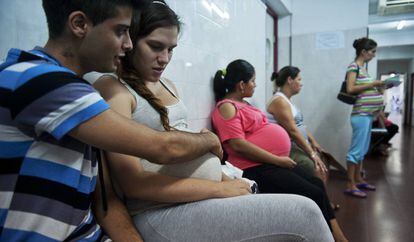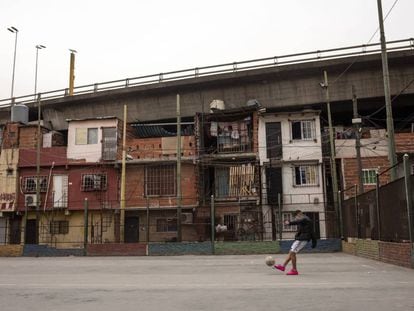One in six children in Argentina is born to a teenage mother
Welfare groups say the poor have kids earlier and that 69% of teen pregnancies are not planned
Tamara Vescovo was 17 when she had her first child. Two years later, she has a second, aged nine months. She is bringing them up alone, in the outskirts of Buenos Aires, because her partner was arrested two months into the second pregnancy. Her only sources of income are house cleaning and collecting waste cardboard. She works long hours and pays a friend to look after her children.

Tamara’s case is typical in Argentina, where 15% of young women have been through a similar experience. According to the official statistics, one in every six children in Argentina is born to a teen mother and 69% of those pregnancies are unintended.
Gala Díaz Langou of Cippec, an Argentinean think tank that focuses on public policy, believes addressing the issue of teenage pregnancies in Argentina should begin with effective sex education in schools, which she argues is not being taught properly.
Many teenagers only think in the present. Others want children and really love them Martin Ferreira, founder of NGO SonRisas
“We need more rigorous supervision of what is happening in the classrooms in this regard. The first step in reducing the number of pregnancies among young people is education, and the second is free contraception in public hospitals,” she says.
Teenage pregnancies are on the rise in Argentina, says Mabel Bianco, the president and founder of FEIM, an NGO that campaigns on women’s health issues, adding that in most cases, adolescent girls have not made the choice to become mothers, especially when they are under 15 years old: “A girl that age does not have the capacity to decide whether she wants to be a mom or not.”
At the same time, Fernando Zingman, a health specialist with Unicef, says that many vulnerable young women with few other options in life decide to have a child as a way of finding a sense of purpose. He says that this reflects deepening inequalities in Argentinean society: while wealthier groups are delaying motherhood, those living in poverty are bringing it forward.
Díaz Langou agrees: “What we tend to see in young couples that have children is that the girls withdraw from the labor market and the males start working early in low-paid, low-skilled jobs to support the family,” she says. As a result, neither finish their studies and are unable to improve their situation as they grow older.
“These households reflect the distribution of poverty in our country. Today we are assigning poverty at birth. Half of children under 14 live in poverty. We are generating the worst conditions for them in terms of opportunities,” she adds.
He decides, not her
Zingman also says that men tend to decide on the use of contraception in Argentina. “At present, there is a male dominance in couples over the use of condoms. During negotiations, the man decides if one is used or not.”
The Argentinean NGO Haciendo Camino (Making Progress) runs a program at health centers in the north of the country that aims to prepare vulnerable young pregnant women for motherhood.
Teenage pregnancies are on the rise in Argentina
Ivana Carbonari, a coordinator for the NGO in Añatuya, in the province of Santiago del Estero, tells the story of Marcela, 15, who was 28 weeks pregnant when she approached the organization. “She is a mother who had a lot of problems with a violent partner. Finally, she had a premature baby. The baby was in hospital for a month until it gained the right weight. With the support and help of the organization, both were able to get on,” she says.
SonRisas (Smiles) is a non-profit organization that works in Monte Grande, a small town around 25 kilometers south of Buenos Aires, where it set up a special program to provide sex education for teenagers. But its efforts ran into reality.
“Despite the course, in the end, a lot of adolescents ended up becoming parents. This was very frustrating for us, because we provided the information, but for one reason or another they made different choices. Many of them just think about the here and now. Some of the others actually want to have children and they really love them,” says Martin Ferreira, the organization’s founder.
English version by Nick Lyne.













































